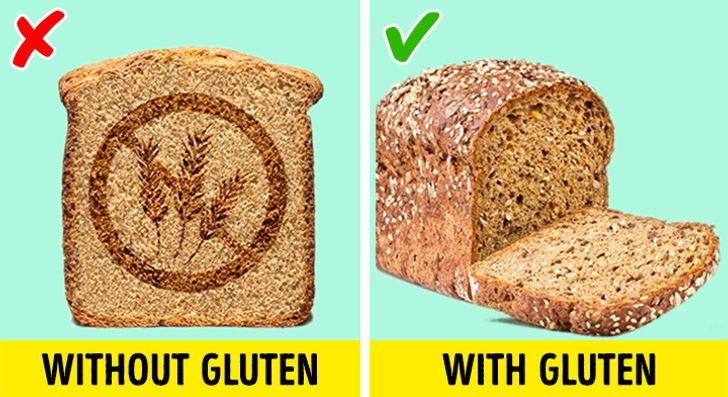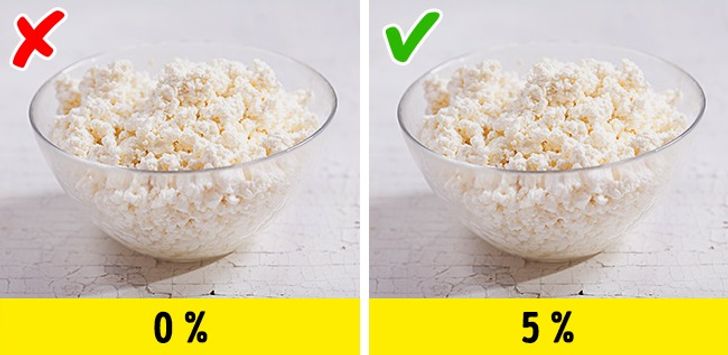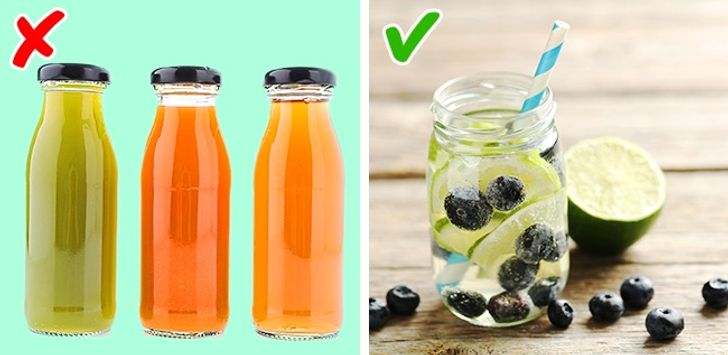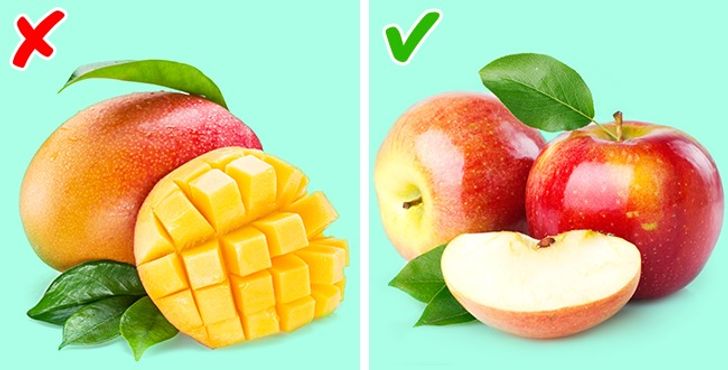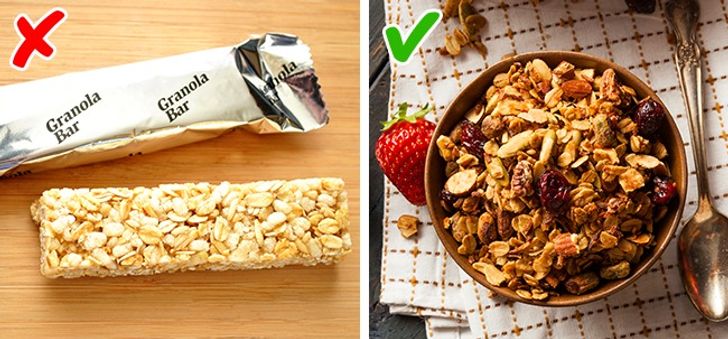Wow! I didn't new a fried egg had more calories. I thought it didn't matter. Anyone already knew all these?
11 Fatal Mistakes That Even Gurus of Healthy Eating Make
When shifting to a healthy lifestyle, many people are unable to reach their goals. Maybe the reason is in their confidence that they have chosen the right strategy for eating. But if we look closer, we will find out that much of our knowledge about healthy products is actually false.
We at Bright Side support people’s struggle toward self-perfection and want to help them improve their knowledge in the area of healthy eating. Let’s finally bust the 11 most popular myths about healthy eating.
1. We choose organic products.
Organic products are believed to be healthier and safer than regular ones but there is no scientific evidence that proves this. When growing these products, farmers don’t use synthetic pesticides. Instead, they are replaced with natural pesticides and their side effects have been poorly studied.
Moreover, the “Eco” or “Natural” mark on the package doesn’t always mean healthier food. Sometimes it’s just a marketing ploy that is used for increasing sales. When buying these products it’s important to pay attention to their content, origin, and appearance.
2. We prefer products without gluten.
Recently, products containing gluten have been considered harmful. There are people who really need to stick to a gluten-free diet because they have been diagnosed with celiac disease. But only about 1% of people have this disease.
In all other cases, there is no scientific evidence proving that staying away from gluten improves our well-being. According to the latest research, rejection of gluten increases the risk of cardiovascular disease because whole grains are eliminated from our diet.
3. We buy low-fat products.
In pursuit of a healthy lifestyle, many people choose low-fat products. But very few of us realize that by reducing the level of fats, manufacturers compensate their product’s content with other components for improving taste. For example, with sugar, flavors, stabilizers, and trans fats, which are bad for our health.
Products with a normal fat content are necessary for a balanced and healthy diet. It’s only necessary to exclude fats for real medical reasons. In all other cases, lowering the percentage of fats in a product will be enough.
4. We drink fruit juices.
Fruit juices contain a lot of sugar, and at the same time they don’t have dietary fiber. This can lead to an increase in appetite, overeating, and weight gain. Juice satisfies neither our hunger nor our thirst. And this fact makes it little different from sweet soda drinks.
Instead, it’s better to opt for a whole piece of fruit or essence water with fresh fruits.
5. We eat energy bars.
These bars are good for a quick snack on the go. They are sold in the healthy and diet food departments of supermarkets. But are they really that healthy? Most bars contain sugar, chocolate glaze, caramel, artificial flavors, and other additives. They are no different from ordinary sweets when it comes to the volume of sugar, while the amount of calories in them equals a full-fledged lunch.
Don’t be lazy, and spend more time eating well. If you want something sweet, then try a bit of dark chocolate. This will be good for your health as well as satisfy your sweet tooth.
6. We prefer to eat dried fruits.
The usefulness or harm of dried fruit directly depends on the conditions in which they were cooked and stored. As a rule, manufacturers process fruits with a chemical composition before drying, which helps to extend the lifespan of the fruits but decreases their beneficial features. Dried fruits are good and healthy if you cook and dry them at home by yourself. When choosing them in a store, it’s better to buy those dried fruits that don’t look attractive, aren’t shiny, and are rough to the touch.
7. We choose eggs with a brown shell.
The myth saying that eggs with a brown shell are better has been popular for quite a long time. The size and the color of an egg depend on a hen’s breed, while the color of its yolk says what the hen was eating for lunch. The main rule for choosing eggs should be the conditions of their storage and the way they look. The safest option is clean eggs, without cracks, that are stored in a fridge.
8. We drink sports drinks.
Due to a tight connection between sports and a healthy lifestyle, sports nutrition is often perceived as healthy. However, sports drinks contain sweet soda water, as well as corn syrup, artificial food additives, and colorants.
The manufacturers of sports drinks recommend quenching thirst with their products during training. But these won’t quench your thirst and will actually decrease the efficiency of your physical exercise. A sports drink made with your own hands is a good way around this.
9. We buy imported products.
Many people have a stereotype that foreign products are better than the local ones. Sometimes this can be true, but not always. For example, consuming seasonal local products is healthier than those that were brought over from abroad. An apple, grown on a local farm in natural conditions and sold immediately, contains more useful elements than an exotic fruit brought from another country and processed by chemical composition in order to overcome a long journey to the buyer. Of course, imported products have some advantage too but, when choosing them, a person should pay a special attention to the storage dates of the product, its composition, the manufacturer, and the importer.
10. We buy granola.
The hype around granola (baked groats and nuts) has been created mostly by marketers. Along with fiber and iron, granola has a lot of sugar and some not very useful oil, which makes it useless. Of course, some stores sell granola where the content of harmful elements has been minimized. That’s why it’s important to study its composition carefully when buying it.
The rule that the healthiest food is the one that you cook yourself works well in this case. That’s why it’s better to buy the necessary ingredients and bake them yourself.
11. We limit the amount of food we consume but we forget about counting calories.
The difference between consuming a fried and a boiled egg is that the boiled egg provides 66 fewer calories. So, if you eat 2 boiled eggs, it would be 188 calories, which is only slightly more than one single fried egg.
Is there anything that we have forgotten? Please tell us about it in the comments!
Comments
Related Reads
My Wife Told Me She’s Pregnant, but She Doesn’t Know I’ve Actually Had a Vasectomy

12 People Who Were Even More Terrified After Discovering the TRUE Causes of Eerie Events

My Ex-Husband Spent the Money Saved for Our Son on His Stepdaughter

15+ People Who Made a Last-Minute Decision That Changed Everything

I Canceled My Husband’s Birthday Party After Hearing What He Secretly Told My Daughter

15+ True Life Stories With an Unexpected Finale That Deserve a Movie

12 Stories About Surprises That Can Await Us on a Journey

18 Parents Who Had Their Children’s Back, No Matter What

15 Stories of Exes Who Can Turn Your Life Into a Nightmare

I Refuse to Let My Daughter, 12, Share a Room With Her Stepbrother, 14

15+ Airplane Passengers Who Had a Shocking Experience on Board

17 Warm Stories About Pets Who Come to Rescue Any Time


